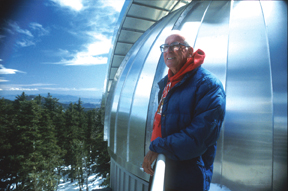|
News Notes
Science & Society
Priest resigns amid evolution talk
 Amid the sunshine and cacti that grace the grounds of the University of Arizona in Tucson, stands an office where about half a dozen astronomers puzzle over the universe’s unknowns. The astronomers are Jesuits; they make up the Vatican Observatory Research Group. The group is in a period of change, however, as George Coyne has resigned from his position as director of the Vatican Observatory.
Amid the sunshine and cacti that grace the grounds of the University of Arizona in Tucson, stands an office where about half a dozen astronomers puzzle over the universe’s unknowns. The astronomers are Jesuits; they make up the Vatican Observatory Research Group. The group is in a period of change, however, as George Coyne has resigned from his position as director of the Vatican Observatory.
Astronomer-priest George Coyne recently resigned as director of the Vatican Observatory, after 25 years in the position. Photograph is courtesy of George Coyne.
With the news of Coyne’s resignation came speculation that he was pressured by the Roman Catholic Church to resign, as Coyne had become an increasingly outspoken opponent of intelligent design (ID), which holds that the complexity of life is itself evidence that something intelligent must have designed it. “There were some people in high places — some cardinals and [others] — that from a political point of view didn’t like some of the things [Coyne] did,” says William Stoeger, a Jesuit astronomer with the Vatican Observatory.
On Jan. 31, Coyne gave a speech at Palm Beach Atlantic University in West Palm Beach, Fla., titled “Science Does Not Need a God. Or Does It?” Part of Coyne’s speech focused on a July 27, 2005, op-ed story that appeared in The New York Times. Written by Cardinal Schönborn, who had previously studied theology under the current pope, the op-ed appeared to some to support ID and “generated a certain amount of objection from a number of people,” Stoeger says. In his speech, Coyne cited five “errors” in Schönborn’s story. He countered the errors with statements such as, “the apparent directionality seen by science in the evolutionary process does not require a designer,” and “intelligent design is not science,” according to a partial transcript from the National Center for Science Education.
That Coyne had been “forced out” of his directorship position for voicing such thoughts, however, is “simply not true,” Stoeger says. The main reason Coyne resigned was that he is nearly 74 years old, and had been director of the Vatican Observatory for almost 28 years, Stoeger says. “For a long time, he and other people had felt that there was a need for somebody new to take over.” Coyne, although no longer director, will continue at the observatory as a staff member when he returns from a year-long sabbatical at a parish in Raleigh, N.C.
Filling the observatory’s directorship position since August has been Jose Funes, who was previously on the Vatican Observatory’s staff. Funes most likely will not engage immediately in the science and theology dialogue as Coyne had, Stoeger says.
Still, Stoeger says that he and others at the observatory will continue to engage the science and theology discussions. And while Stoeger calls it “unfortunate” that Schönborn confused a philosophical interpretation of evolution with evolution itself, the cardinal’s comments do not reflect official church teaching. Stoeger says that bishops who he has spoken with say that ID completely misses the point and call it “bad theology.”
Instead, the church’s official teaching still reflects a 1996 statement to the Pontifical Academy of Sciences by Pope John Paul II that evolution is “more than a hypothesis,” Stoeger says. “I think that it’s very clear that Catholic theology, as well as other areas of nonfundamentalist Christian theology, are making every effort to connect with the sciences because they realize the sciences are one of the key — but not the only — channels to the truth” (see story, this issue).
Exactly how the current pope views evolution, however, remains uncertain. In 2004, Pope Benedict XVI (then Cardinal Ratzinger) reportedly supported the notion of species change via evolution, but his writings indicated concern that the theory denies the role of God. The pope has since called the creation of the universe an “intelligent project,” according to a Sept. 1 The New York Times story.
Evolution was the subject of Pope Benedict’s annual weekend seminar with students in early September. A summary of conclusions from the meeting might be published within a year, Stoeger says.
Kathryn Hansen
Links:
"Evolving a higher understanding between religion and science: A look at The Evolution Dialogues," Geotimes, November 2006

 Subscribe
Subscribe

